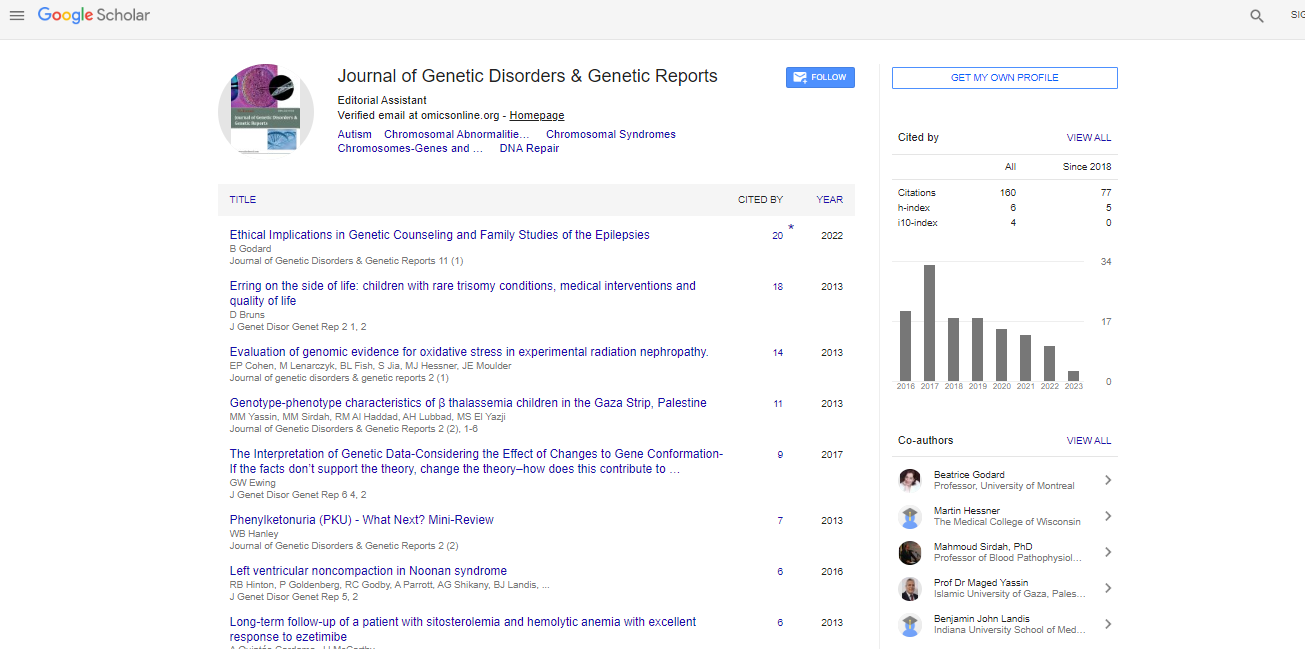Perspective, J Genet Disor Genet Rep Vol: 12 Issue: 3
Neurogenetics: The Intersection of Genetics and the Brain
Min Plenge*
1Department of Neurosciences, University of the Philippines Manila, Manila, Philippines
*Corresponding Author: Min Plenge,
Department of Neurosciences, University of
the Philippines Manila, Manila, Philippines
E-mail: plengemin@gmail.com
Received date: 15 May, 2023, Manuscript No JGDGR-23-106029;
Editor assigned date: 17 May, 2023, PreQC No JGDGR-23-106029 (PQ);
Reviewed date: 01 June, 2023, QC No JGDGR-23-106029;
Revised date: 08 June, 2023, Manuscript No JGDGR-23-106029 (R);
Published date: 16 June, 2023, DOI: 10.4172/2576-1439.1000210
Citation: Plenge M (2023) Neurogenetics: The Intersection of Genetics and the Brain. J Genet Disor Genet Rep 12:3.
Abstract
Description
Neurogenetics, the fascinating field that merges genetics and neuroscience, holds the key to understanding the intricate relationship between our genetic makeup and the functioning of the brain. It explores how genetic factors influence the development, structure, and function of the nervous system, as well as their implications for neurological disorders. By unraveling the complexities of neurogenetics, scientists aim to shed light on the origins of brainrelated conditions and pave the way for innovative treatments.
The nervous system, composed of the brain, spinal cord, and peripheral nerves, plays a crucial role in orchestrating complex cognitive, motor, and sensory functions. Genetic factors heavily influence the formation and functioning of the nervous system. During embryonic development, genes regulate the precise wiring of neural circuits and guide the differentiation of neurons into specific types. Genetic variations and mutations can alter the development and connectivity of the brain, potentially leading to neurodevelopmental disorders or predisposition to neurological conditions.
Identifying genetic variants
Genetic studies have revealed numerous genetic variants associated with various neurological disorders, including autism spectrum disorders, schizophrenia, Alzheimer's disease, and Parkinson's disease. These variants can impact gene expression, protein function, or signaling pathways critical for brain development and function. Advances in genomic sequencing technologies have facilitated the identification of these genetic variations, offering crucial insights into the biological underpinnings of these disorders.
Genetic risk factors
While some neurological disorders have a clear genetic basis, many conditions are influenced by a complex interplay between genetic and environmental factors. Genetic risk factors can increase an individual's susceptibility to developing a disorder, but they do not guarantee its occurrence. Environmental factors, such as prenatal exposures, stress, diet, and lifestyle, contribute to the manifestation and severity of brain disorders. Understanding the genetic risk factors and their interactions with the environment is essential for comprehending the complex etiology of these conditions.
Precision medicine in neurogenetics
Neurogenetics has paved the way for precision medicine, an approach that tailors treatments based on an individual's genetic profile. Genetic testing and genomic sequencing allow clinicians to identify specific genetic variations associated with neurological disorders. This knowledge enables personalized interventions, including targeted drug therapies, gene therapies, and lifestyle modifications. Precision medicine holds tremendous promise in improving diagnosis, treatment efficacy, and patient outcomes in the field of neurology.
Ethical considerations and future directions
As we delve deeper into the realm of neurogenetics, ethical considerations become paramount. Issues related to privacy, consent, genetic discrimination, and the potential misuse of genetic information must be addressed. Responsible research practices, clear guidelines, and robust regulations are essential to navigate the ethical challenges surrounding neurogenetics. Future directions in the field include further research to uncover additional genetic factors, advancements in genetic editing techniques, and the development of innovative therapies to mitigate the burden of neurological disorders.
Conclusion
Neurogenetics offers a profound understanding of the complex relationship between genetics and the brain. Through the exploration of genetic factors, scientists are unraveling the mysteries of neurological disorders and paving the way for personalized treatments. As we continue to unravel the intricate workings of neurogenetics, it is crucial to ensure ethical practices, safeguarding privacy and promoting equitable access to genetic information. With continued research and collaboration, neurogenetics holds the potential to transform our understanding of the brain and improve the lives of individuals affected by neurological conditions.
 Spanish
Spanish  Chinese
Chinese  Russian
Russian  German
German  French
French  Japanese
Japanese  Portuguese
Portuguese  Hindi
Hindi 



